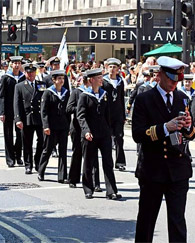According to a report in the The New York Times quoting several unidentified British Ministry of Defense officials, the move to allow openly gay soldiers to serve in the military since 2000 has been a non-issue.

In 2000, the British government was forced by the European court of human rights to withdraw its ban on homosexuality in the military. In July 2006, members of the Royal Navy (shown in the image above) marched in the EuroPride parade along Oxford Street in London. Image source: www.proud2serve.net
Acknowledging the sensitivity of the issue in the United States where gay and lesbian service members are discharged, the British official said: "We're not looking to have quotes taken out of context in a way to imply that we're trying to influence the debate in the United States. There are some sensitivities over the timing of this. We have had communications from our counterparts in the United States, and they have asked us questions about how we've handled it and how it's gone on the ground. There does seem to be some debate going on over how long the current policy will be sustainable."
The US military has lost almost 10,000 gays and lesbians under its "don't ask, don't tell" policy which was introduced in 1993 by then US President Bill Clinton. The debate about the policy was rekindled in March when Gen. Peter Pace, who as chairman of the Joint Chiefs of Staff is the country's top-ranking military official was quoted as saying in the media that he believed that homosexuality was immoral.
In 2005 - five years after the ban on gay service members in the general armed forces was lifted, the Royal Navy entered into a partnership with gay advocacy group Stonewall and actively sought gay recruits by advertising in the pink media. The same year, the Army set up a recruitment stall at the Gay Pride festival in Manchester for the first time and was represented by 10 gay and lesbian soldiers in combat trousers and T-shirts marching alongside a Royal Air Force float on the five-mile parade through the city.
